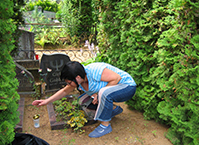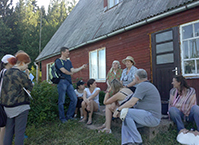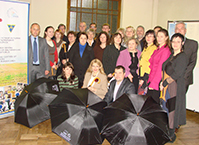About the school years and parties
Categories: Mode of life, Antonina Ludborza
Story-teller: “Earlier, you know, I don’t know our, our, I mean, in our surroundings we had a school, exactly in our village and one teacher was from our village as well. But they followed all those, let’s say, latest trends. Well. We organized evening parties. That was done on the part of the school, by the teachers; those were considered home parties but we organized them at school. When I attended school, at least six parties were organized a year. We had a big room in our school. That room was of irregular form and it was possible to remove the walls. In the middle of the room there was the oven, so, people danced around that oven. We, schoolchildren, were in all that, no party passed without such performances. We sang, and, as it was said then – declaimed, yes, staged small plays, some one-act play. But later, in kolkhoz times, in the same school, we did not have any club, but the school keeper allowed us to organize youth parties. And then we staged even three-act plays.”
Interviewer: “Who played for you at those parties?”
Story-teller: “What did you ask?”
Interviewer: “At the parties, who played music?”
Story-teller: “Our locals played music at the parties, there were some musicians in our village. One brother played the accordion, one played that, that, the violin, there was the cither, our neighbour played the cither, and he also had the drum. And music was good at the parties.”
Interviewer: “What was the music, maybe you remember some song, or dance?”
Story-teller: “What?”
Interviewer: “Do you remember any song or dance, which you liked most at the parties?”
Story-teller: “You know, at that time all those schlager songs were played – “No tumša meža ir dziemām gals” and “Dzīvīte, dzīvīte”, “Lela liesmiņa”, and then there was such a small booklet of Latvian songs and they mainly played from that little book. Schlagers, you see, now also that Dzintars Čīča sings “Atceries, meitenīt, birztalu kluso”. All those songs were played. During the great war, they played the same legionary songs that were considered forgotten. Nice songs were played.”
Interviewer: “But which was your favourite?”
Story-teller: “I really liked “Pie Dzintara jūras”, I liked that song. I liked also other songs, like that “Dzīvīte, dzīvīte”, I liked a lot of songs. I can’t name them right away. It seems that I liked all of them. It seems that all the songs were beautiful.”
Images
Audio
Researcher: Dr. philol. Gatis Ozoliņš, Daugavpils Universitāte












